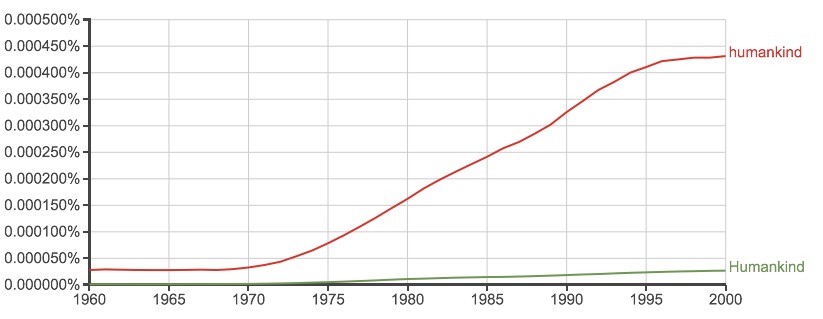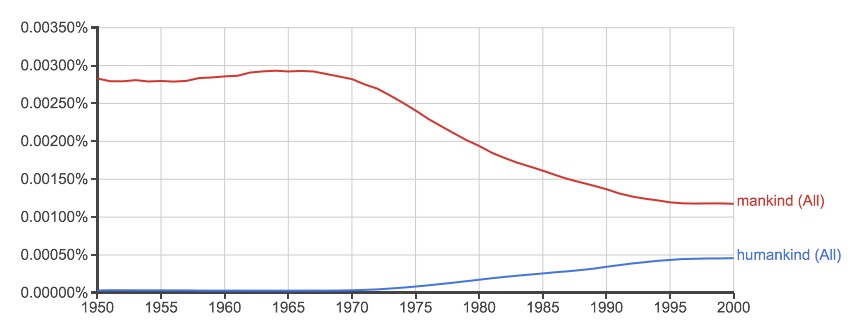Since there is no universally accepted measure of gender bias in individual words or expressions, what you are asking resolves into a matter of opinion. What can be objectively measured, however, is the frequency of word usage over time.
Mankind, Humankind
The element man in both mankind and woman is — or at least was originally — gender-neutral, just like the German indefinite pronoun man ‘one’ today. To speak exclusively of males, the word menkind emerged in the late 14 c.
By the time humankind emerged as an alternative to mankind in the mid-17th century, man referred exclusively to males, while the capitalized Man could refer to humans in the abstract, either as natural or cultural beings. Humankind was only incidentally gender-neutral, i.e., it was not coined for that particular purpose, and in subsequent centuries its usage was never especially frequent. What it had that mankind didn‘t was three syllables: it became a convenient way for poets and hymnwiters to fill out a line:
I dreamed because all humankind, by folly lured and led.
Had selfish grown in heart and mind — that parenthood was dead. — Fibre & Fabric: A Record of American Textile Industries in the Cotton and Woolen Trade, vol. 12, 1890.
Bear JESUS CHRIST the LORD in mind, Who sore by grief was tried ;
Out of pure Love to humankind Upon the Cross He died… — Orby Shipley, ed., Lyra Eucharistica, 1863.
The practice of using obviously male-gendered nouns and pronouns to refer to all of humanity — the inclusive masculine — is a grammatical construct not inherent in the words themselves. In response to the feminist critique of a grammar and lexicon that left women only as implicit, silent partners, humankind found favor by those seeking a more gender-neutral term. This preference is reflected in a Google NGram:

This steep increase looks far less dramatic when compared to the continued use of mankind:

The drop in frequency of mankind is not balanced by the increase in humankind, which suggests that 1) other inherently inclusive words such as humanity are being used instead, or 2) writers in English have become less presumptive about making pronouncements about the whole human race.
Man hours/manhours, Person hours
To judge by attestations in the Google Book corpus, person hours was coined in the early 1950s, most likely to distinguish it from man hours, to measure accident rates:
The average accident rate, therefore, was 6.82 deaths and 682 injuries per hundred million person hours. With these average figures as a base, the relative hazard of any particular activity during the same year may be found…Traffic Engineering, vol. 22, 1952, 228.
A person hour was one person spending one hour in automobile travel.
The first usage as a synonym for manhours is in 1975. In this century, however, not covered by a Google NGram and thus not available for comparison, the usage of person hours in the Google Books corpus since 2000 is almost exclusively in the sense of manhours:
The project effort is measured in person hours, person months, or person years with the preferable unit being person hours because it entails less subjectivity of units. — Manfred Bundschuh, Carol Dekkers, The IT Measurement Compendium, 2008.
All times are listed in person hours; those tasks requiring more than one carpenter to complete — for example, installing 2x4-framed platforms, which are too heavy to reasonably expect a single carpenter to carry — would take less total time… — TD & T. (Theatre Design & Technology Journal), 44-45 (2008), 64.
Conclusion
The increase in both humankind and person hours suggests that it is far easier for a social movement to influence the frequency and meaning of already existing nouns then promulgating new coinages or dramatically altering the grammar of English to conform to some agenda. I remember the first time I was told by a professor in the 80s that humankind should be the preferred term, and despite agreeing with the argument for more inclusive language, I felt it was affected and agenda-laden. Now, of course, I would no more use the word Mankind than I would call a refrigerator an icebox.


